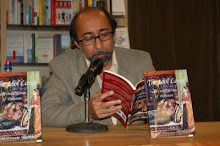Roshni apa's advice and praise!
This means a lot to me as I consider her my mentor-sister. Her kindness and encouragement not just towards me but many writers of South Asian diaspora who came after her needs to be acknowledged and celebrated. In her words:
Secondly--the "critic speaks"--I found
the spacing/pacing of how the stories appear in the collection
disturbing--short, short and then longer and longer--Maybe that is my
own inner ear--with all my musical training--my rhythm is always my
own! Drove some of my music teachers cray--especially dance teachers!
Great and wonderful surprise
to find myself in the story in the very good company of our own and
much beloved Ijazbhai and our favorite Mahmood--but the
story itself needed an editor. I know--because all my works need an
editor.
The "critic" and aficionada of Moazzambhai's stories continues--Remember how I continue to be haunted by your story of the man with the transistor radio--and of the man who kissed the Holy Land?! Two other Moazzamnarratives have joined the company--"Jhura and Lali"--absolutely an amazingly moving gem--showing that a narrative/a story will go to the heart of a matter with much more power than any academic essay. Every time I read it, I cry--those sandals and the face struggling to keep intact!
And then the
Cafe le Whore--! Absolutely different and yet--As you know, your Ammi
was very dear to me--I have always held her blessings close to my
heart--and yes, I knew how difficult it was--life with her--and how true
a son you always were to her. But even if I didn't know all this--the
story is a powerful tribute to a mother-son and to the "lost" (to the
"normal" world) people with whom we live every day--and yet we don't
live with them. Who are the real phantoms?
Many years ago,
as Chuck and I were driving through San Francisco, I saw some people
begging (no euphemisms please!) on a road divider--I don't remember
where it
was. All of a sudden, I saw an older man, tall, emaciated in a
pyjama-kameez--the kind of brown/grey that men wear in the North West
and I yelled "Abba"--he didn't resemble my father--but he was a man, I
would have called "Abba" anywhere in the world --Chuck realized what had
happened and that I needed to stop and go to the man and see what I
could do--but when I turned back, he had completely disappeared--we
couldn't see him/find him. I see your story, "Cafe le Whore" as a sad
but sincere honor, a tribute to your Ammi, to the Abba who disappeared
and all the human beings so many people wish would disappear.
As I said before--Moazzambhai--thank you.
Added comment:
As soon as you began talking about bringing the street(s) alive (all the
locations in all the stories are alive), I knew that that was what has
continued to haunt me. The places, the events and the people can't be
separated (remember Sara Suleri talking about that in Meatless
Days?)--and you bring all three to life--and sorrow-compassion act like a
thread that weaves them
together. Bravo, Moazzambhai


No comments:
Post a Comment